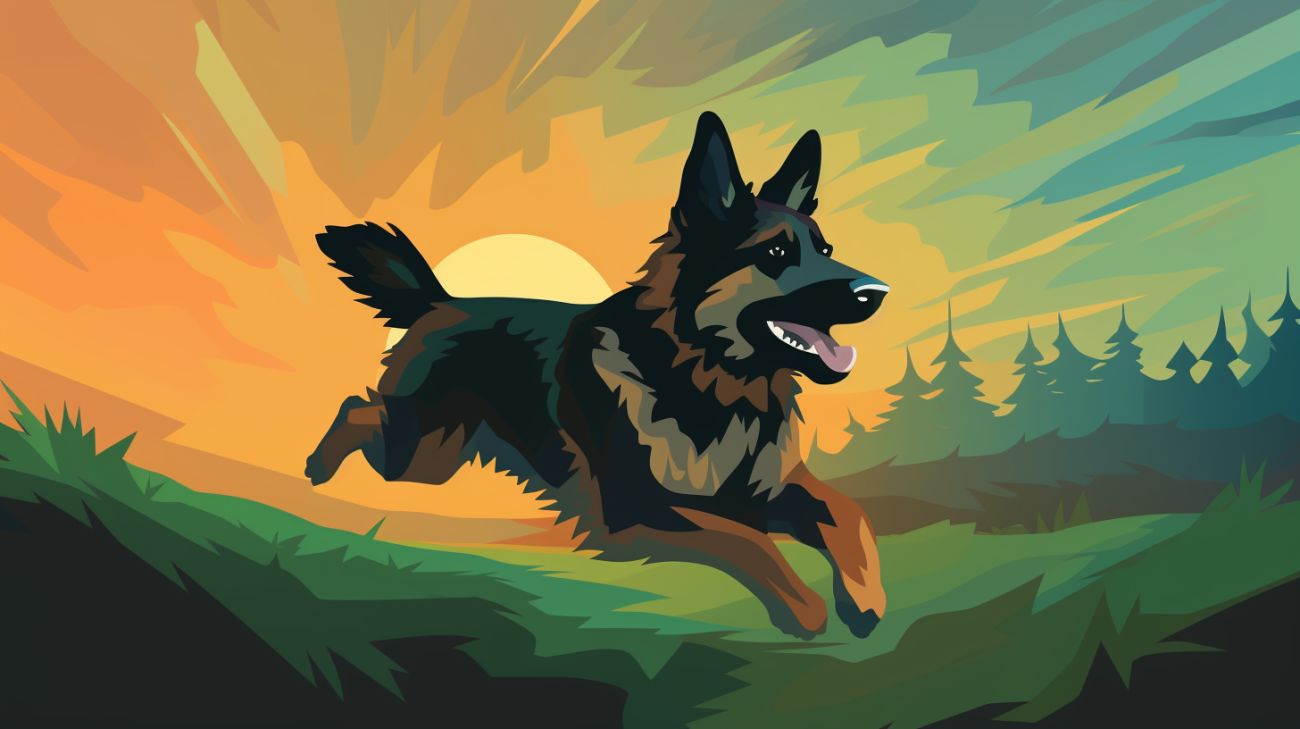Key takeaways
Finding a lost pet can be distressing and time consuming. It can feel like an impossible task, especially if your high-energy German shepherd has gone missing.
However, this happens often because of our pups' need for adventure and exercise.
We've broken down how to find your German shepherd into 3 simple steps so you and your pet can be reunited as soon as possible!
Quick Navigation
How to find a lost German shepherd

1. A thorough physical search
Look for signs of escape: An open gate, a broken fence, or a hole are all indications that your pup escaped from your backyard. Finding these clues will give you an idea of where they went next.
Check outbuildings: Garages, sheds, and bin stores all make perfect places for your pup to explore. However, they are also easy places for your furry friend to become trapped. Doors can slam shut and windows can be difficult to get out of again, so make sure you check all areas where your German shepherd could be stuck.
Search your neighbors' yards: If your dog is sociable, it's likely they're out seeking new friends. The best place to do this? Your neighbors' yards, especially if they have dogs. With permission, ask to search around their houses and their outbuildings. Don't just stop at your immediate neighbors. Be sure to search your whole street because if your pup has picked up on a scent they can wander for miles!
Search further afield: Now you've checked your immediate area, it's time to venture further. Try local shops, fields, farms, woods, town centers, and parks. If your lost pet is adventurous, they'll have no problem making friends in the park. However, if you have a more timid dog, they may be hiding in quieter back streets.

Bring their favorite toys (preferably ones that make sound so you can attract them to you)
Bring food and treats
Bring their leash
Call their name gently
Be patient

2. Start a PetRadar search
Provide you with a personal dashboard to manage your search and keep an eye on sightings
Send you a printable lost dog poster so you can distribute it physically
List your lost pet on our site
Give you guidance and support throughout the process

3. Lure them back home
Leave food outside: While it may also attract some unwanted wildlife, leaving food outside your home can help attract your lost dog. They are likely pretty hungry, and the smell will help guide them back to their house.
Leave strong-smelling items outside: One of the most important scents for dogs is their territory and their family. That's you! Try leaving blankets, clothes, and toys outside to help your pup recognize their home.
Open up windows and doors: The familiar sounds of your household should help your pup find their way home. Opening up your doors and windows will let the sounds travel further!

Why do German shepherds run away?
Energy

Curiosity
Taking them on lots of different walks so they don't become bored
Train them to come back on command if they catch a scent
Keep them on the leash when they're exploring somewhere for the first time

Instincts
Hunting: German shepherds have a high prey drive which means they'll often chase small animals like squirrels, birds, or even other smaller dogs or cats. Your dog may run for miles before they realize how far they have traveled, making them likely to become lost.
Mating: If you haven't neutered your female dog they are likely to run away when they are on heat. This is because their instinct to breed is incredibly strong. Similarly, if your male dog catches the scent of a female on heat they can run for miles to try and find them. If you know your dog is in heat, keep them inside!

FAQs
Would a German Shepherd survive in the wild?
Because of their intelligence and high prey drive, German shepherds would be able to survive in the wild. They can withstand low temperatures and can hunt well.
What are the odds of finding a lost dog?
90% of lost dogs are found, so the odds of finding your lost pet are high.
How long can a German Shepherd stay outside?
A German shepherd can stay outside indefinitely. As long as they have access to water, food, and shelter and the temperatures don't drop too low, they will be able to survive.
How long can a lost dog survive?
A lost dog can survive for a long time because of their ability to run, hunt, and adapt to their environment. However, they can only survive 72 hours without water.
Are German Shepherds known for escaping?
Because German shepherds are highly intelligent, they are known for escaping. They need a lot of stimulation, so if they are left alone for too long, not exercised enough, or neglected, they will likely escape and run away.
How do I stop my German Shepherd from running away?
To stop your German shepherd from running away, make sure you are giving them enough attention and stimulation. Change up your trails, don't leave them alone, and exercise them for at least two hours a day.
Will a German Shepherd stay in the yard?
A German shepherd can stay in the yard if they are getting enough exercise and attention throughout the day. It's also important to make sure they aren't outside if temperatures drop too low.



